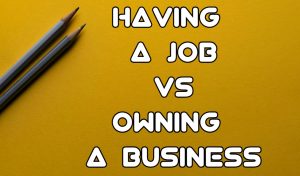Job or business, Which is Better?: Most individuals have fantasized about quitting their day jobs and embarking on a path to self-employment. A business ownership ambition, on the other hand, is no longer regarded as a pipe dream but is instead completely supported, encouraged, and even glorified. In fact, in certain countries, you can’t go anywhere without running into someone who is working on a venture or a side business. It’s crucial to note, though, that establishing a business and working for someone else demand distinct mindsets and skillsets, and each has its own set of advantages and disadvantages.
Business ownership may not be suitable for everyone, just as being an employee may not be appropriate for everyone. We’ll examine the reality of working as an employee and as a business owner, considering the benefits and drawbacks of both.

Recommended: 10 Advantages and Disadvantages e-banking
Advantages of owning a business
a. You have a chance to advance in your career: When you decide to own a business, you are giving yourself the power to realize your personal dreams, goals, and interests. You get to be in charge of your surroundings. Nobody gets in the way of your decisions, where you want to work, or how you want to handle things. Your life becomes your own, which means you take chances that are within your comfort zone. If there is a market for your services, you may be able to make some money.

b. There is a lot more independence as a business owner: Because you get to be your own boss when working as a business owner, there is no one there to peek over your shoulder to tell you what to do. You are free to make decisions in your career or personal life based on the needs you have at that moment.
You may choose to work whatever hours you want, whenever you desire to work them, and even change your office location if you wish. This independence is extended to any employees you may have as you all work together to make money.
Recommended: How to become a successful business entrepreneur
c. You have the freedom to determine your own working hours as a business owner: As a business owner, you will determine the operating hours that best fit your needs. You can have a job where you can sit back and start working as little as possible each day if you have access to resources and outsourcing.
d. You have the option to alter or expand your current situation: When you work as an entrepreneur, you are not locked into a job that you despise. You might start pursuing a new opportunity if it appears interesting and has the potential to generate more money. You have the power to change gears at any time, whether that means retraining yourself or your staff or growing your company. That implies you’re in charge of your own fate at all times. If you want to start looking at things from a different perspective, go ahead and do it.
e. You have the option to alter or expand your current situation: When you work as a business owner, you are not locked into a job that you despise. You might start pursuing a new opportunity if it appears interesting and has the potential to generate more money. You have the power to change gears at any time, whether that means retraining yourself or your staff or growing your company. That implies you’re in charge of your own fate at all times. If you want to start looking at things from a different perspective, go ahead and do it.
Also see: Best side hustles for students who wants to make money while in school
f. It’s a chance to make money based on your entire potential: When you operate as a business owner, you have no restrictions on how much money you can make. The quality of your concept, your skill to promote your concept, and the effectiveness of your selling tactics will always determine how much money you make.
The only limitations on your riches are those that you put in place yourself. If you’re facing financial difficulties, a passive income as a business owner might help you get the extra cash you need.
g. It is an opportunity to get your ideas out quickly: It might be difficult to get your ideas out to the market first if you work for a typical job. In a typical workplace, you must traverse numerous layers of hierarchy. When you work for a regular income, you might not even get full credit for the fruits of your innovation. When you work as an entrepreneur, this problem vanishes totally. You may start proactively solving people’s issues, which will allow you to build goods or services that will earn you money.

Recommended: Best Programmers in the World: Top 10 Most Famous
Disadvantages of owning a business
a. As an entrepreneur, you do not have a guaranteed income: When opposed to individuals who pursue entrepreneurship, one of the most significant benefits that workers have is a fixed income. Despite the possibility of getting fired or laid off, the money you earn for your profession comes in on a regular basis. As a result, entrepreneurs and their families are operating with a lesser level of financial security. Employee compensation sometimes includes a variety of financial advantages for their family, such as health and life insurance.

b. As a business owner, you have greater duties: When you work, you will be assigned a certain position or task to accomplish. You are solely accountable for completing the duties that have been assigned to you, which are often connected to the position for which you have been employed. It is unnecessary to be concerned about the efforts of others. You are compensated for having a narrow field of vision or tunnel vision. You may even receive performance assessments depending on how well you perform in your current position, which can lead to promotions.
If you’re a business owner, you’re in charge of everything, all of the time. Business ownership needs determined individuals who are willing to take on the associated obligations. You are in charge of the firm’s money, as well as legal concerns, sales, keeping the company viable, and a variety of other tasks. It is entirely in your control whether the company succeeds or fails. Increased responsibilities, on the other hand, offer you a bigger investment in your company and can help you learn a range of essential skills.
Also see: Best African countries to do business
c. As an entrepreneur, you must have a high level of self-discipline: Entrepreneurs can only succeed if they can set high standards for themselves that they follow when carrying out their duties and obligations. This quality must also apply to their immediate reports. For there to be any prospect of success, there must be some amount of natural leadership existing within the context of the opportunity being pursued. You have the option of slacking off while there is work to be done, but doing so may restrict the amount of progress you make on an idea.
d. There are tax consequences to think about as well: You become your own employer in the viewpoint of the tax rules if you make money as an entrepreneur. That implies, in addition to your own, you are liable for the employer’s part of Social Security and Medicare withholding.
e. Possibility of a business failure: Every year, a large number of successful companies emerge, increasing competition in the market. There is no such thing as a sure thing in business. A great entrepreneur, on the other hand, does not give up at the first indication of trouble. Instead, they bounce back even stronger than before by implementing new business plans and devising inventive ways to combat their competitors as well as any economic or demographic shifts.

Recommended: How to start a business with small capital and be successful
Advantages of having a job
a. You have a steady source of income: Full-time work contracts require you to be paid a monthly stipend that is agreed upon, protected, and legally required. Within agreed-upon fiscal pay periods, your employer must also pay legally necessary tax and pension contributions, as well as any bonuses or commission payments. Working full-time offers financial stability, which provides professional and financial peace of mind, as well as the capacity to budget properly over time.

b. You’re entitled to paid leave: Employers must also provide paid leave to full-time employees. Employers are obligated to give minimum mandatory leave lengths, which vary from country to country and firm to company. Some employers will offer additional paid time off depending on a number of factors.
Employers are trying to achieve a decent work-life balance, and knowing that you have paid time off is a big part of that. Workers have the right to and need to take time off to rest, recover, and relax.
Also see: How to become a successful lawyer
c. You have a set work schedule: Full-time jobs usually include pre-determined working schedules, such as weekly hours or shift patterns. Unlike freelance or contractor work schedules, which are often project-based, short-term, or at the request of a customer, this is not the case. In this aspect, full-time employment provides regular work schedules and strict commitment standards.
d. Taxation is easier: When you work as an employee, you don’t have to worry about anticipated taxes, self-employment taxes, or other tax-related expenses. That is taken care of by your human resources and payroll divisions.
e. There is a reduction in the amount of uncertainty: Even if you’re living paycheck to paycheck, the work provides a measure of security that gives you confidence. Self-employed people don’t have to worry about getting laid off or fired, but they do have to find new clients in order to get paid, which isn’t always simple.

Also see: How to be a good conversationalist
f. Flexibility: It is frequently simpler to leave a job than it is to find a new one. There will be no buyout deal. You are free to offer your notice and go. If you leave too soon, you may have to pay back something. However, if you’re having trouble deciding where to live, having the option of a quick exit might be quite useful if you discover you’ve joined the incorrect practice.
g. Fewer hassles: As an employee, you don’t have to deal with all of the headaches that come with operating a business. Someone else is in charge of that. Your boss will be in charge of all hiring and firing, as well as all business decisions. You may concentrate on your medical profession.
Recommended: Money vs Love, Which is More Important? Answered
The disadvantages of having a job
a. It may be tough for you to strike a balance between your personal and professional lives.
A full-time job encompasses all aspects of one’s life. Finding a balance between a productive and successful working life and time away from the grind can be tough, given that we spend two-thirds of our waking lives at work. This can result in overwork or, in the worst-case scenario, burnout.
b. It can be more difficult for you to locate new employment: There is a school of thinking that claims having a job makes it simpler to get another. Job hunting, on the other hand, involves a significant amount of time, effort, strategizing, and patience, all of which become more difficult to devote to when you’re working full-time and your every professional minute is dedicated to an employer.
Furthermore, because of your loyalty, it may be tough for you to leave your employment. Although this isn’t always a bad thing, you may find it tough to split ways with that firm when the time comes to pull the trigger and leave.
Also see: Top law firms in the world 2022
c. You are unable to choose your projects: Although there is no established formula for full-time working schedules or workloads, employers who provide full-time contracts typically have well-defined hierarchies, structures, and workloads. This implies that, unlike freelancers or contract employees, you won’t be able to pick where your abilities are put to use. For some, this can be annoying and restricting.
d. You could become bored: One of the most significant hidden disadvantages of full-time employment is boredom. Boredom is a result of regularity and a lack of interest in your job, and it may stifle your career if left uncontrolled. Most importantly, it makes you a less effective employee, which will show up in your continuous performance monitoring, analysis, and employee ROI. Boredom has the consequence of making you a bad worker.
e. Your engagement may change without your consent at times: Many employment contracts provide that your services will be best employed by the firm at their discretion, which is also referred to as a forced transfer. If you’re on a fantastic team with a wonderful boss and the corporation transfers you to another team where you despise it, your options for making a new change may be restricted.
Recommended: Best online universities to attend in the world
f. It’s possible that you won’t be paid what you’re truly worth: More perks may be offered by companies, but they generally come at the price of your take-home pay. You may even be required to work from home to satisfy your employment obligations, but the tax benefits of a home office are more limited than if you were self-employed.
Recommended: Father or Mother, Who is more important in the family? Answered
Job or business, Which is Better?
It’s impossible or rather difficult to say outrightly whether it is better to own a business than work as an employee. Some people may be born business owners, and running their own businesses brings them personal fulfillment, joy, and accomplishment. Some, on the other hand, are predestined to be employees. Which is the preferable choice?

There is no simple answer. Your goals and personality are the driving forces behind all you do. Sure, being a business owner allows you to work when and where you choose, but you still have to work. Contrary to what some experts claim, working four hours a week as a business owner will not get you very far. It will not take place. Start a side business while continuing working your day job if you think entrepreneurship is for you. Before making the transfer, build up a financial reserve and commit for at least six months to a year. This way, you’ll get a taste of what it’s like to be a business owner.
Being a business owner isn’t for everyone, and working for someone else isn’t either. Each side has significant advantages and disadvantages that impact one’s stress level, work/life balance, and personal contentment. People are not so much called to be business owners as they are called to be business owners. Successful business owners realize early on in their professions that they are meant to create their own business. They may believe it runs in their family.
Being a business owner is hazardous, but it can pay off handsomely if done right. One of the most appealing features of being an entrepreneur is that there is no limit to their potential. However, being an entrepreneur is dangerous, since around half of all firms fail within the first five years. Business owners risk becoming “workaholics” if their businesses need much more than 40 hours per week. Because of this job addiction, there is a terrible work/life balance, and friends and family are frequently neglected.
Business owners may also choose their own schedules; if you’re most productive at night, go ahead and work all night. Setting your own hours does not mean you will work less; in fact, over 30% of entrepreneurs work 45-60 hours per week while making less money than if they had a normal job. Following our review of the advantages and disadvantages of owning a business, you may assume that everyone should do it. This could hardly be more untrue. Various people have different skills. Some abilities are more suitable for starting a business, while others are more suitable for permanent jobs.
Employees benefit from a consistent income (at least while working) and fewer worries. The employer is in charge of keeping the company profitable and dealing with any issues that arise. Employees often receive a benefits package that includes things like paid time off (PTO), insurance, and retirement alternatives. On the negative side, most employees’ income is restricted based on their position within the organization.

Employees have bosses (who have agendas) who may hinder an employee’s capacity to pursue their passion and accomplish what they truly like. Employers, in general, have the authority to instruct employees when they must go to work and when they may take time off. While this is necessary for a company to operate, it can wreak havoc with an employee’s personal obligations, such as sick children and medical visits.
There is no better approach to making ends meet than the one that is best for you. If you are a person that loves to take risks, is competitive, and someone that has a strong interest in business, you should consider starting your own business. If you are a person that loves to play it safe, reduce stress, and find joy in your own ambitions, employment may be the best option for you.
Recommended: Advantages and Disadvantages of being self employed
In conclusion, whether you want to be a business owner or an employee, you should make your decision focused on what is best for you, what you want to accomplish with your life, and what you can do. Of course, you may do both and work while starting a business.

Edeh Samuel Chukwuemeka, ACMC, is a lawyer and a certified mediator/conciliator in Nigeria. He is also a developer with knowledge in various programming languages. Samuel is determined to leverage his skills in technology, SEO, and legal practice to revolutionize the legal profession worldwide by creating web and mobile applications that simplify legal research. Sam is also passionate about educating and providing valuable information to people.